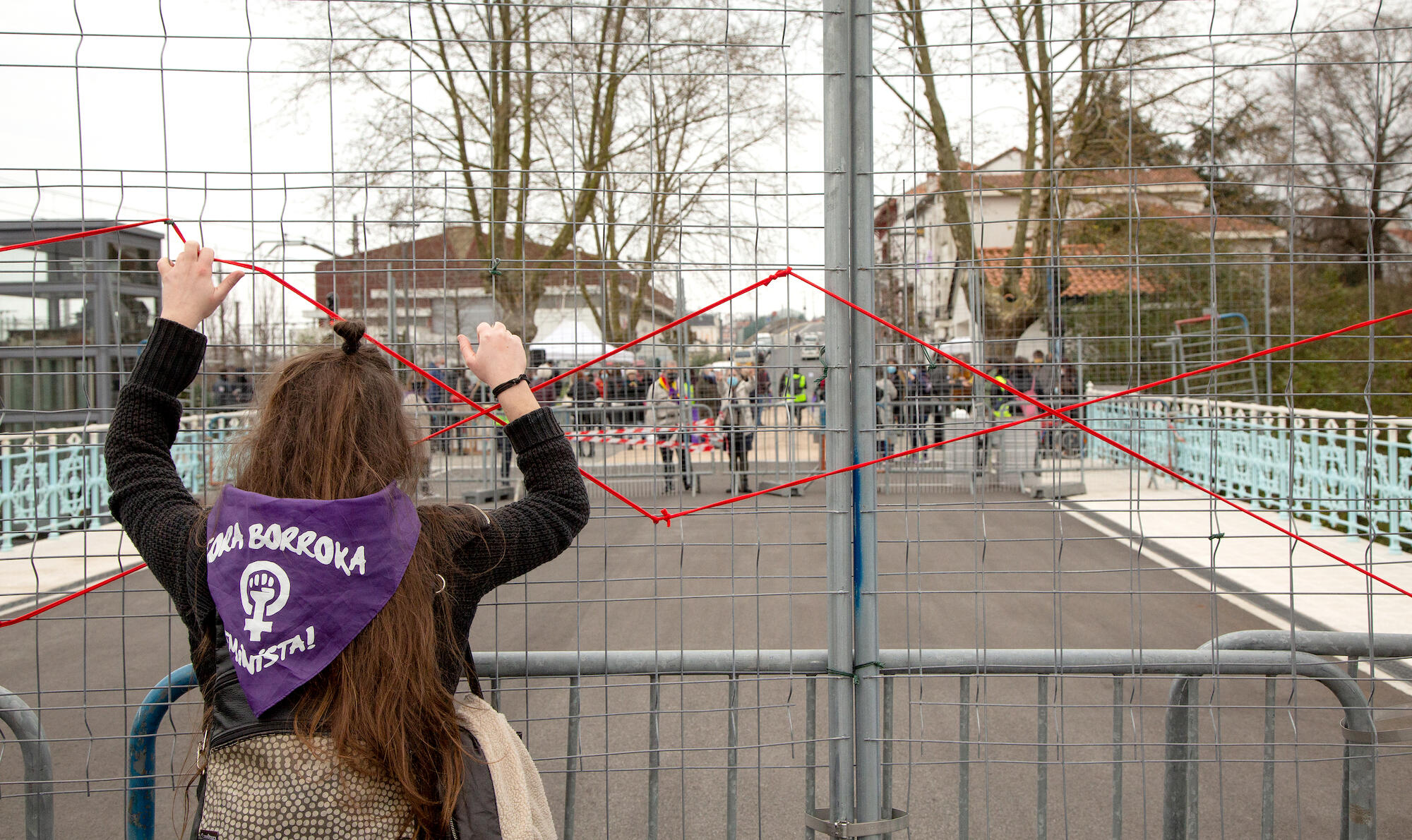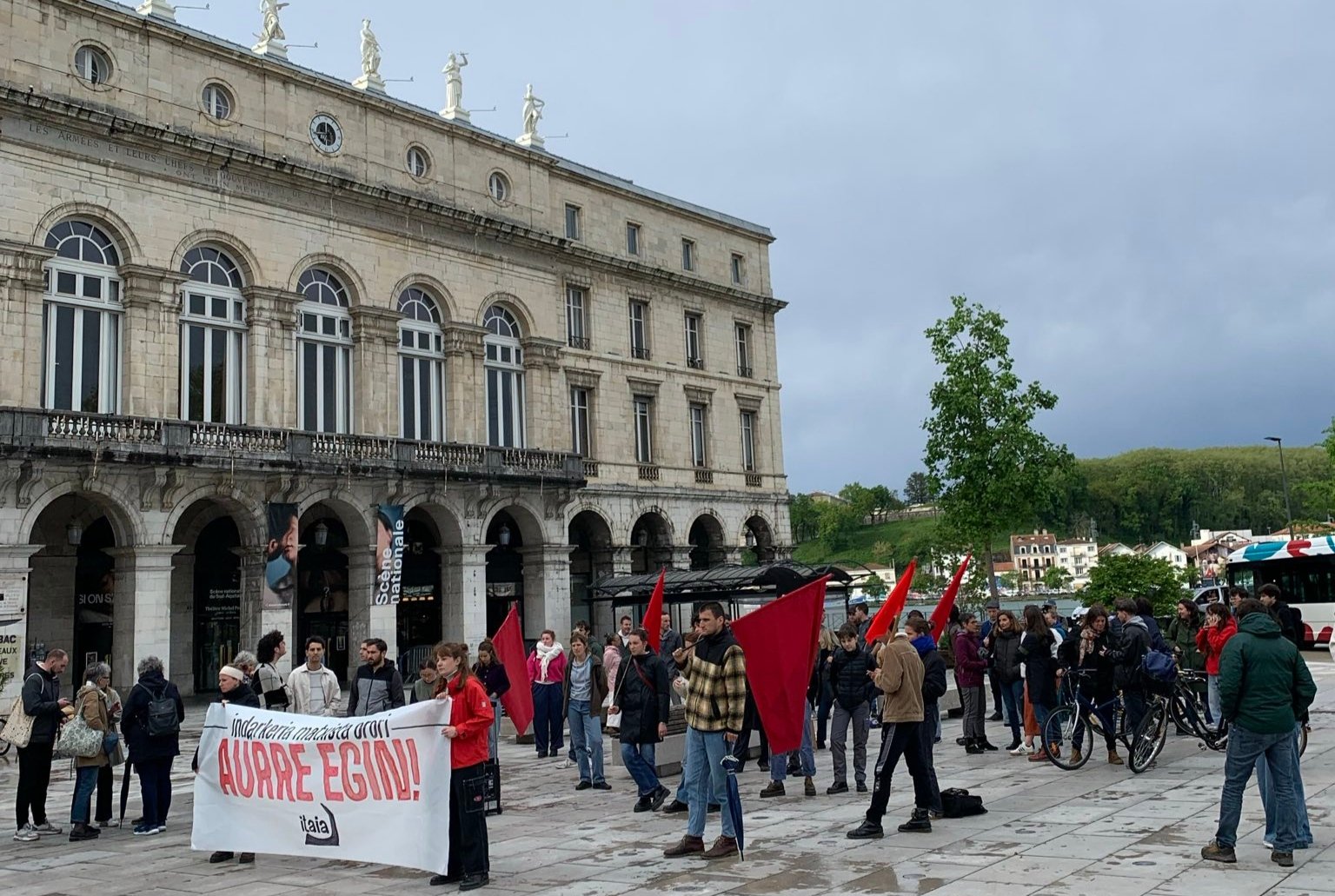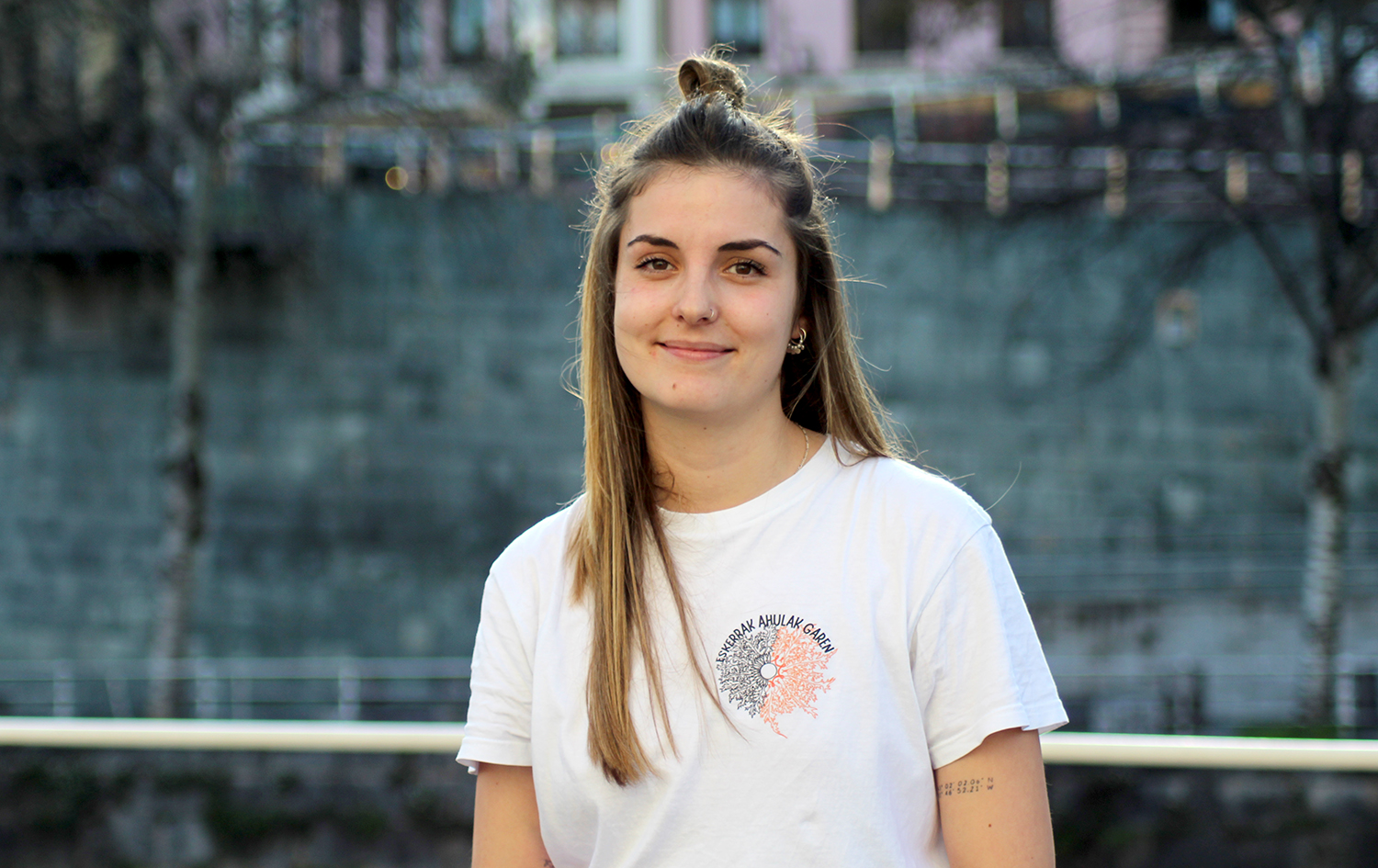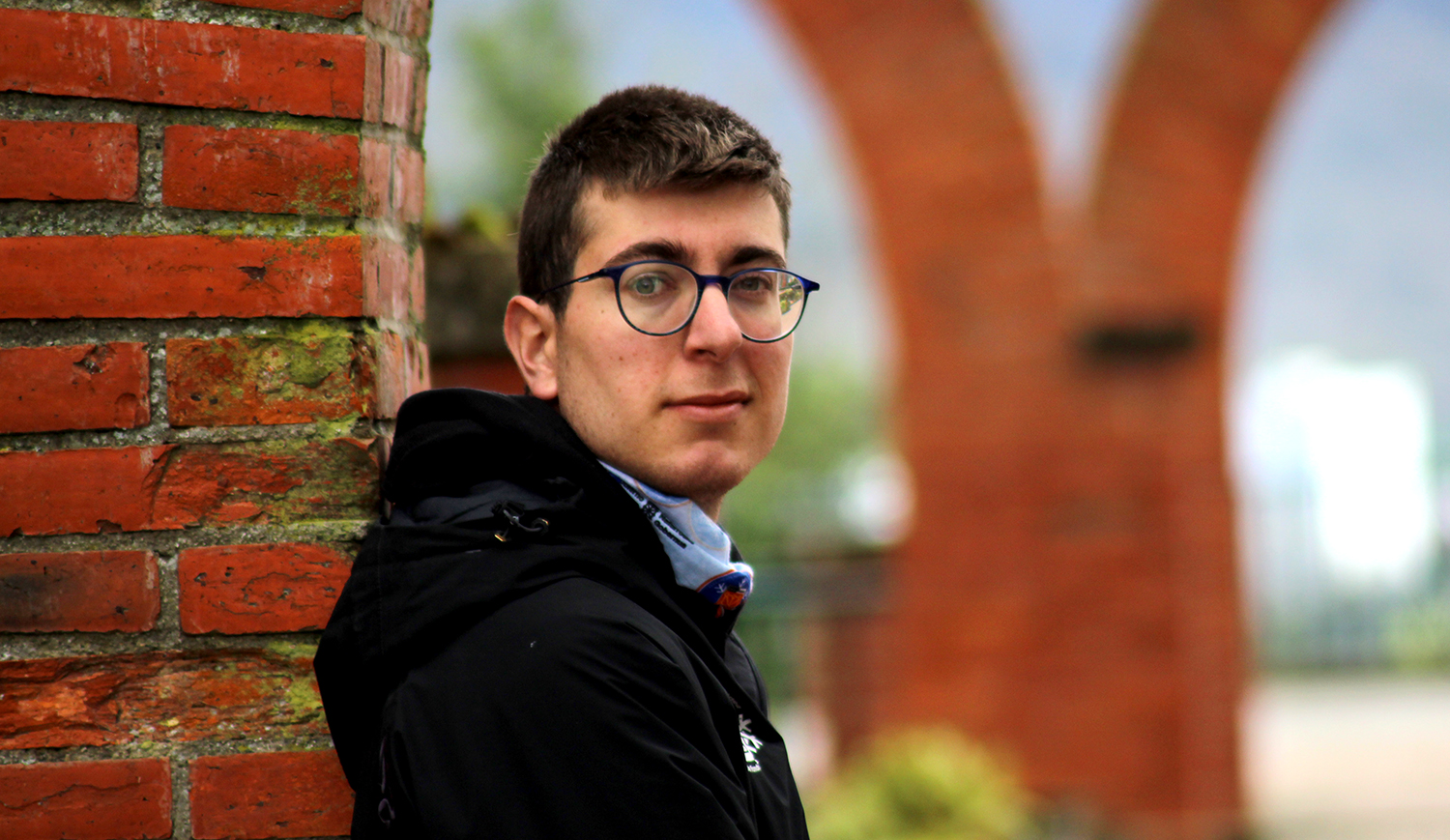Looking for new utopias
- Maialen Lujanbio and Jule Goikoetxea participated in the last session of the ‘The Present Story’ of Bilbao. They consider that to end “obsolete” stories, other stories should be created. And art can help that.

“And if there were no stories, what?” asks the journalist Goizalde Landabaso. Journalist Maialen Lujanbio and political philosopher Jule Goikoetxea are silent. After a few seconds, Goikoetxea has given a clear answer: “Without stories we would not exist.” The three women have met at the Bira Cultural Center in Bilbao, within the Oraina reporting days. The Bilbain association Zenbat Gara and Bira have organized four sessions, the last being Lujanbio and Goikoetxea: The next story. Everyone from their area has talked about stories.
Goikoetxea has talked about the current “outdated, miopes and casposus stories”. He has also given an exact name to these stories: Narratrix. But what exactly is a narratrix?
“Narrative or foundational narrative.” That is, that sex is binary, universal morality, that the child has the private property of parents, or that man is rational. “What makes us different from animals is intelligence.” These are the reptiles, which are the ones that humans have to fulfill to be human. Goikoetxea has pointed out that in the human world only one third is human, as another two-thirds do not meet standards for human beings. “This mammal that is born, is not systematically human, needs stories for human beings.” It says that anything that does not meet those standards will be left out. Among them are those who do not have white skin, those who do not have money, those who are too small or those who have breasts but do not have height.
Goikoetxea highlights that the story is “strong”. Because people follow some concrete stories so as not to remain “on the periphery” and not to be “read as monsters”. The main cause is fear, “the fear of not entering normality”.
Goikoetxea is clear that these reports can be addressed. The key is to create new stories: “New narratrix.” Goikoetxea also knows who will produce the stories. “They will be created by those on the peripheries, those who are seen as monsters, those who are not understood, those who are invisible.” According to him, they are the people who can create new stories and, consequently, imagine new futures.
According to Goikoetxea, language is also influenced in the reports. In his account, the Basque Country influences directly. “When I make Basque, my community is another imaginary.” For example, he explains that the audience at the conference is not going to talk to the “Spanish public”. He also believes that for the Basque country to be able to offer a new vision in the future, there must be a “different political community”. “The political community, the carnal, has to be different: institutional, territorial, cultural, artistic, people, our daily life… If that is not different, the Basque will not be different.” The Basque Country can generate reality. And for that he has political and cultural products: “We have that, now we have to maintain it and strengthen it. We need material capabilities, a state to start, and I leave it there.”
Another way to count
Lujanbio wanted to put another issue on the table. He talked about art, specifically the verse. “Bertso is a story that has brought us the transmission of the past and always makes a story of the time.” It is not very clear, however, whether verses can make a story that may come in the future. However, it is clear that it can reach where the verse and art in general, “academia and theory” do not arrive. “Enter the audience, especially in live performances.”
Art has a capacity: it can ignore the main and hegemonic stories and tell something else. “Artistic form is a path.” What society knows beforehand can be told differently: “Sharp, poisoned, crooked.” But, according to Lujanbio, this is not his only ability: creation can touch a listener's vein that is not affected by anything else. “When a song or verse touches that vein, a kind of distortion occurs.” Lujanbio finds it difficult to explain this feeling because it seems “inexplicable”. “However, I hope you have ever felt.”
Despite the fact that both women have initiated dialogue from different areas, both share the view that the new utopias are necessary and that the creation should be involved in them. With new utopias and stories they face “obsolete” stories. “It’s not important to me how many stories there are and if everyone has room, but how much the stories we have here weigh,” Goikoetxea says. And he says that we have to analyze the structure that follows each story: “How much each one weighs, why and how it breaks.” According to him, there are three stories that are “structural” columns: “the accounts of capitalism, patriarchy and colonialism; in addition, they are systems of domination that derive thousands of subordinations”. It suggests that these stories should be analyzed, why they have been “recreated” and how they can be “broken”. Because he has made it clear that the stories are “material”: “It is believed that they are ideas, but the stories weigh a stack, everything is materiality. Matter communicates, story is a type of matter.”
Alternative structures
Goikoetxea denounces that “we do not have new reports because we have taken our eyes to think only of the utopias of the elderly”. And as the stories have stolen, they have also stolen utopias. But Goikoetxea is optimistic. “There is an alternative.” New utopias can be created: “Alternatives, movements and many innovative practices are emerging in many countries.” However, there is a problem. Goikoetxea explains that when these practices are “incorporated by the system” they “normalize” them. And if it doesn't include structures, it's not taken into account. “When we generate transformations, we don’t have alternative structures. Thus, they gain the largest and most powerful structures.”
To confront the “big” structures, the political philosopher has given the keys to creating new utopias: “Utopia has to illusion.” And how can illusion awaken? Through new images and new concepts. “Utopia is creation, we have to mix art and look for new things to delude.” Lujanbio fully agrees that “artistic language can create another world that makes something else possible.” According to bertsolari, the art world “distills” that utopia and joy, even on a “small” scale.
After talking about stories, utopias and art, Landabaso has made the last request to Lujanbio: “I have received many words from you: narratrix, and this point, the truth, utopia, us, lichen, the conflict, the brick, the pamphlet, the avant-garde, the performance, the mysticism… this is a verse!” People laugh too. And after looking at all the words on the Landabaso page, he replies quickly: “Maybe I do some verses written at home.”
Errepikatu nirekin: Sara Millerey. Ez dezagun ahaztu bere izena. Transfeminizidioaren biktima da Millerey: gorrototzaile transmisogino batek torturatu zuen, besoak moztu zizkion eta bizirik bota zuen ibaiertz batera. Bi orduko agoniaren ondoren hil zen.
Errazagoa da J.K... [+]
Many Basque feminists have been disappointed to learn that writer Chimamanda Ngozi Adichie has externalized pregnancy, meaning that a surrogate has fertilized her baby for money.Adichie is the author of the essay We should all be feminists, among others. They have ignored the... [+]
Indartsua, irribarretsua eta oso langilea. Helburu pila bat ditu esku artean, eta ideia bat okurritzen zaionean buru-belarri aritzen da horretan. Horiek dira Ainhoa Jungitu (Urduña, Bizkaia, 1998) deskribatzen duten zenbait ezaugarri. 2023an esklerosi anizkoitza... [+]
Gozamen aparta bezain deskribatzeko zaila dakar, norbaiten hitzak irakurri edo entzun ostean, zera pentsatzeak: “Horixe zen neu aurreko hartan azaltzen saiatu nintzena!”. Idazlea eta itzultzailea da María Reimóndez, eta galegoz aritzen da, hizkuntza... [+]
Orain arte desgaituak ez diren pertsonekin lehiatu da Uharteko Ipar Eski Taldeko Eneko Leyun eskiatzailea (Iruñea, 1998). 2024-2025 denboraldian, lehenengo aldiz parte hartu du Adimen Urritasuna duten Pertsonentzako Iraupeneko Eskiko Espainiako Txapelketan. Urrezko... [+]
Joan den urte hondarrean atera da L'affaire Ange Soleil, le dépeceur d'Aubervilliers (Ange Soleil afera, Aubervilliers-ko puskatzailea) eleberria, Christelle Lozère-k idatzia. Lozère da artearen historiako irakasle bakarra Antilletako... [+]























